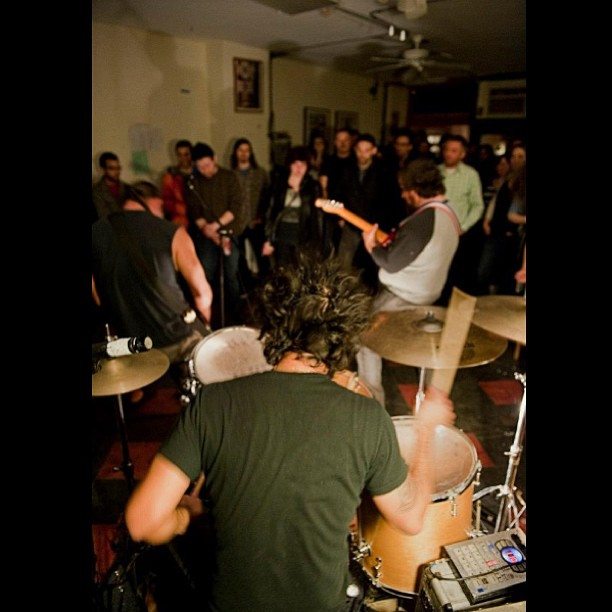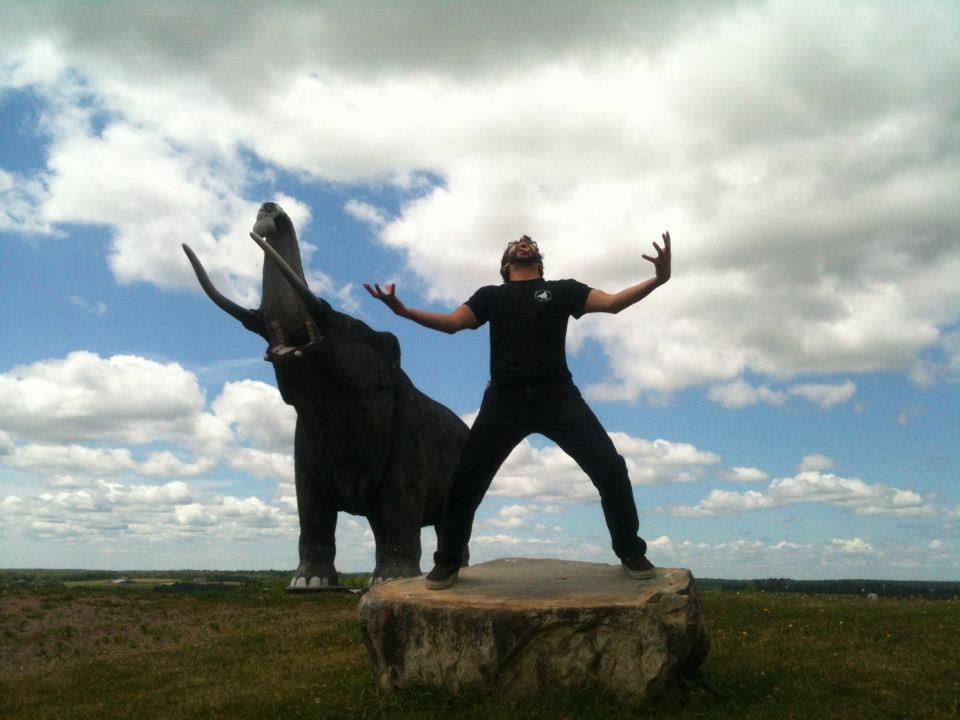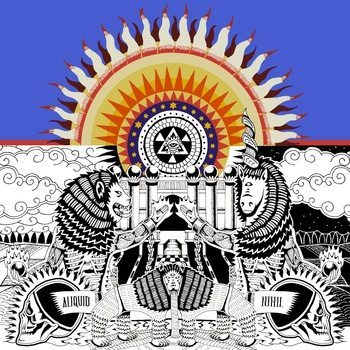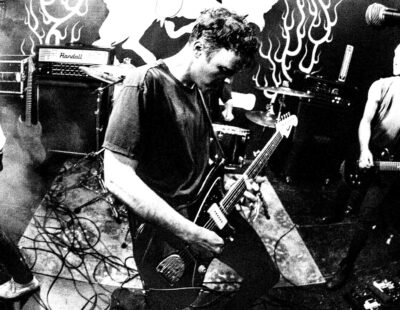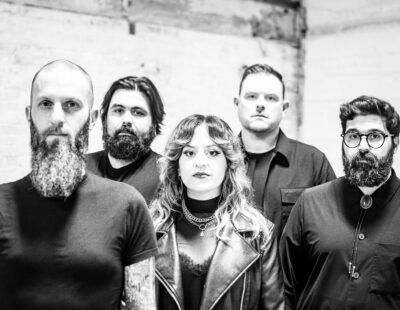Ontario’s Biipiigwan is a quizzical beast of a band. From their moniker and line-up’s open-door policy to their sound and members being spread out across this humongous province of ours, questions pertaining to how, why, where and who usually abound when the band is the topic of conversation. The driving force behind this are-they-metal?-are-they-hardcore?-are-they-noise-rock?-are-they-sludge-doom?-just-what-the-hell-are-they? is bassist/vocalist/guitarist Musqwaunquot “Musky” Rice, who is the lone original member and organisational focal point when it comes to getting things together for the purposes of writing, recording, touring and all the usual band stuff. The band has just released their latest, Something for Everyone; Nothing for Anyone, a record loaded with coruscating riffs, hammer-hitting-skull drumming, one hell of a headache-inducing cover and oodles of thematic references to Rice’s native heritage. We caught up with them a couple days after polishing off yet another tour of Canada and the US.
Ok, first and most boring question: what can you tell us about the history of the band?
Musky: Myself and my friend, Andrew Baird (drums) started as a two-piece “grind” (for lack of a better term) outfit in 2008. It’s taken a lot of member changes, learning and greenhorn mistakes to get to where we are now, but the core line-up has been myself and Mike Shrives from basically the beginning, with Steve Vargas coming on as our “touring” drummer in 2011, although he’s also written on anything we’ve worked on since he joined. Our main touring members are Mark McGee (drums or bass) and Matt Fleming (guitar). Unfortunately, Mike had to leave the band earlier this year on account of that whole “life” thing that tends to try and stifle one’s musical pursuits.
What does the name of the band mean/refer to?
Musky: A biipiigwan is a war whistle in Anishinaabemowin (Ojibwe language). Sounds corny in English and only slightly less so in Ojibwe. I’ve been interested in reviving and maintaining my traditional language for years now and the band has become a small expression of that in itself.
Your bio makes mention of an early EP that even you guys won’t acknowledge the existence of. This, I’m lead to believe, means that the band has changed, or at least, improved drastically over the years. How would you compare the BP of today to the BP of days gone by?
Musky: In the beginning, we were hindered by a lack of commitment to put adequate work into the music, so we resigned ourselves to being a bit too silly most of the time. It’s never a good idea to take oneself too seriously, but at the same time you’ve got to maintain some dignity, man! It took a bit of time to establish a productive line-up and then more time to get to a place where we can write music we were happy with and tour on it. Nowadays, we’re just a small core writing line-up with a handful of touring members who can jump on to play live. I’m pretty sure that EP is out there online if you want to dig. The song writing is pretty unpolished and we should have left out a couple jokes, but all in all it’s less embarrassing than the time I accidentally farted in grade 12 history class.
Your bio is also quoted as saying “Every band needs a gimmick and this one’s got two brown guys.” Discuss.
Musky: We included that line in our bio as a bit of a joke when throwing stuff out to labels. It is true that metal is a “white,” male-dominated genre and I have a unique perspective as an Anishinaabe person who is the main driving force behind the band, but in the end we’re just a group of guys who love writing loud music and touring it. In getting out and meeting folks across the land, I’ve found that, especially in grind and other subgenres of extreme metal that have been influenced by a punk ethos, dominant societal norms along racial, class, and gender lines are sought to be disregarded. And that’s a-ok in my books. That’s not to say we should pretend that everyone is the same, but rather that recognizing and respecting our differences, alongside our similarities, is a good thing.
Related, can you give a quick run through as to what some of the new songs – or at least the song titles – might be about; specifically “Nishkaak” and “Shkweyaang”?
Musky: “Nishkaak” is the imperative form of the verb to awake (or more accurately, she or he awakes/is waking up) when spoken to more than one person. So, in essence, it’s a command saying “wake up!” to multiple people. In very, very simple Ojibwe (I’m still a beginner), the lyrics relate a story of a man who comes across an injured robin and ignores its cries for help. It’s written as a reminder or a call to all people as individuals to take up their responsibilities as human beings to live in a good and respectful way with one another and the world in which we live. As for “Shkweyaang,” (a locational adverb describing something in the past or behind something), it’s a bit of self-reflecting on the days when the band was down to just me and Mike and our “practices” consisted of just a little bit of practice and maybe some writing, but for the most part was us two sitting around complaining.
What can you tell us about writing and recording the new album? With members spread throughout different parts of the province, how did this impact the processes? Do you feel there’s a noticeable difference in the new crop of songs because of these circumstances?
Musky: In the past, Mike and I would write songs on our own then show one another and maybe make a few changes, or sit down together with a couple ideas and try to come up with something cohesive before presenting to a drummer. Mike and I had most of the bare bones of the album worked out before I moved out of Ottawa and we even had a few opportunities to work on songs as a core group (Steve, Mike, and myself) on the few times we were all in the same city, but there are also songs that were written completely separated from one another. These latter ones were a bit troublesome in the studio since we hadn’t had the time to bang them out a hundred times in practice or live to find all the bugs, but we dealt with it. Most of our stuff has always been written pretty independently and I don’t think there’s a noticeable difference in the end result on account of our separation. If anything, it saved us wasting time nitpicking on inconsequential issues since in the end we keep things simple. If it sounds good to us, then we go with it. It’s not the ideal process for writing music, but we’ve always just plowed through or stumbled over such barriers in keeping this band rolling.
How did you approach recording the drums without the rest of the band present? What were you concerned about most in doing it like so? How do you feel the songs turned out compared to how you had conceptualised them in your head?
Steve: I wrote shitty MIDI versions of what the dudes sent so that I could beat-map the songs. I used the rough demos to see where we naturally sped up or slowed down. [Fuck the Facts bassist and drum engineer] Marc [Bourgon] helped me get everything set up and I was free to bang them out in the comfortable setting that is our jam hall here in Cambridge [Ontario]. It was nice to be able to record at my own pace. My main concern was to have the tempos feel natural while still maintaining a solid backbone that the guys could use to lay their shit down. Sure, I would have loved some gnarly bed tracks, but we did what had to do with what limited knowledge I have to make this work. In the end, I feel the ideas I laid down worked well with the songs. With each band I try to compliment whatever style we’re aiming for and I think I did a good job with Biipiigwan. My mom said I did a good job anyhow.
Musky: For myself, I never had concerns with how songs would turn out in the end. Steve is an amazing drummer and incapable of writing anything shitty, so it was fun and exciting to send him a pile of garbage and let him bring the songs to life. After Steve recorded the drums in Cambridge, Mike and I tracked guitars and bass with [Fuck the Facts guitarist] Topon Das at Apartment 2 Recordings in Ottawa. We finished with the vocals at Apt 2 when Steve came through between one of his various bands’ tours.
Is there a specific story behind your calling the album Something for Everyone; Nothing for Anyone? What’s the significance to the title?
Musky: Like a lot of things with this band, the title started out as a joke. Someone mentioned while recording that we had a bunch of different styles of music in the songs (hence the “something for everyone”), but we joked that ultimately the music would sound like shit and never please anyone (“nothing for anyone”). A strong theme in the album is oppression and when discussing a name, Mike and I talked about how western societies are presented and perceived as “free” and egalitarian despite being strongly socio-economically stratified, moreover with racial bases, especially in colonial countries like Canada and the US, and we noted how that could be tied into the joke from the recording session. The typical person in a “developed” nation enjoys a standard of living not afforded to those whose lands and/or labour that standard is built upon and even then, that typical person is practically enslaved by a political economic power structure that relies upon intellectual subjugation and commoditization of that person’s existence. We thought about calling it “Something for (Almost) Everyone; Nothing for (Just) Anyone” but that’s just overboard, man. Excessive punctuation in band names and album titles is a good indicator of pretentiousness and that semicolon puts us on thin ice as it is.
What the hell is going on on the cover?
Mike: I sometimes look at the artwork and wonder the same thing… Here’s my best to explain: I started out wanting to take a Canadian symbol and distort it in some way as some of the album material dealt with this idea. I tried some ideas with the flag, but nothing really worked, so I went with the coat of arms. I started researching what the various parts of the coat of arms represented, and found a lot of them related/hinted at common “illuminati” and secret society symbols (also rampant in a lot of American symbols, most notably the “all-seeing eye”). I particularly liked that, apparently, the chained unicorn is a symbol of the anti-Christ. So anyway, I loaded it with weird secret society references: Masonic eye and checkerboard floor, the Rosicrucian sun, various alchemy references, and the six-point star which is a common representation of wealth. I also tried to use contrast to have various “conflicts” happening throughout the artwork (black and white; the upper and lower halves; night day; etc.) which I felt again reflected the lyrics and basic themes of the album. I guess it ended up getting a little weird. Ultimately, I was trying for something that would be unique/different, ties together the album’s themes, and rips off [Montreal band] The Great Sabatini just a little bit, but not enough so that people would notice.
How would you characterise the new album against previous works?
Musky: I find the new record to be a little more riff-driven and not as dissonant and ugly-sounding as our earlier work and in my opinion that has to do with Mike having actual musical knowledge (as opposed to myself) and my own song writing becoming a bit more focused. Because of that I think it’s more cohesive and accessible. Also, Topon did an amazing job recording the album; production-wise it’s the best thing we’ve released.
How did your most recent North American tour go? Please share with us some of the more ridiculous adventures and experiences of the run?
Musky: Nothing too crazy ever happens with us since we’re a bunch of aging dudes more interested in nursing our various old man injuries and ailments that flare up on the road, rather than partying. We saw a couple fights because, you know, punk or whatever, and hit some deadly weather on the home stretch in Canada that made for some white-knuckled driving, but managed to avoid witnessing gnarly highway accidents and didn’t have any attempted van break-ins as on previous tours. We covered a lot of ground on this tour and saw some beautiful lands. Also got the chance to stop at the Little Bighorn battlefield and that was a pretty powerful place to visit. All in all, it was a successful tour all around that was made even better by the fact that we’re close friends who tend to laugh off shitty situations rather than get whiny or angry over the inevitable hardships that come with touring as a little-known noisy metalish-type band.
What’s up next, yo?
Musky: We’ve got a blank slate for writing more material, so I’m just going to hole up over the winter months and write stuff to bring down to Steve and bang out some new music with him. It will be interesting to hear how new music will turn out since it’s now just myself and Steve writing. Mike is a great songwriter and he’ll definitely be missed, but as always we’ll just carry on and have a good time doing it. Other than that we’ll do some minor touring before heading over to Europe in the fall of 2014.



